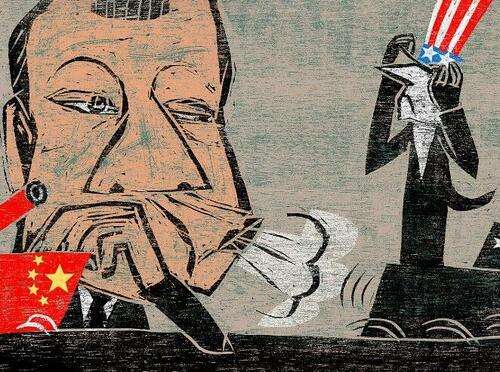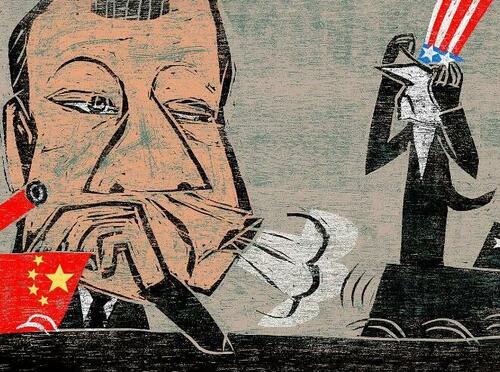Authored by Wolfgang Munchau via NewStatesman.com,
After decades meting out sanctions and financial coercion, the US may soon feel its grip on world trade beginning to loosen…
Change is good, but dollars are better, a US author of romance novels once wrote. A similarly light-hearted sentiment often inspires discussions about the future role of the US dollar as the world’s leading currency. The consensus view is that the dollar is safe. I think the consensus is wrong.
The dollar is the foundation of US global leadership, and the future of the dollar is therefore intricately linked to the debate about geopolitical fragmentation.
Brazil’s president, Luiz Inácio Lula da Silva, asked during his recent visit to China:
“Why should every country have to be tied to the dollar for trade?… Who decided the dollar would be the [world’s] currency?”
These are good questions.
The perhaps surprising answer is that he himself made that decision, together with the former leaders of the other “Brics” group of nations: Brazil, Russia, India, China and South Africa. Their economic-development models have succeeded but have also critically depended on the US dollar. During the period of hyperglobalisation – which I date from 1990 to 2020 – the US became the global importer of last resort, and let its trade deficit against the rest of the world increase. China and many other fast-developing economies built up savings in the currency they were paid in – the US dollar. They invested those savings into US bonds and other assets. The willingness of the US to absorb the world’s savings surpluses was the engine of globalisation. It ensured that the dollar would maintain its status as the world’s leading currency.
This mechanism explains what happened in the last 20 years, but it won’t tell us what will happen in the next 20. Yet the dollar fans assume that the geopolitical and geo-economic environment will stay broadly the same.
If the five Brics countries wanted to end their dependence on the dollar, they would have to do more than just choose another currency to trade in. It is not a menu choice, as Lula suggested during the same speech. He and his fellow Brics leaders would have to change how they interact with the rest of the world, and with one another.
China is key. In 2021, the country derived 43 per cent of its GDP from investment. This is approximately twice the level of the US and other Western countries. If China managed to shift some of its GDP to consumption, it would reduce its external trade surplus, as consumers tend to buy more imported goods. If you wanted to be less reliant on the US dollar, this is where you would have to start. As a second step, China and the other Brics countries could start trading more with each other, become more self-reliant in their supply chains, and set up their own financial infrastructure.
Changing economic models is hard. Three years after Brexit, the UK is still struggling to move away from a model that depended on close integration with the EU. Germany is finding it hard to maintain competitiveness without cheap Russian gas and with impaired global supply. It takes decades to build industrial production lines and supply chains. In China, there are an awful lot of vested political interests at the regional level, which rely on the investment boom continuing. If President Xi Jinping was really keen to extricate China from the US dollar, he would need to impose policies that would meet with resistance from regional leaders. In parallel, China would also have to start a long process of shifting at least part of its $3.2trn worth of foreign reserves held in dollars into other currencies. All of this would take a long time – one or two decades, perhaps.
The reason I think China, Brazil and others will ultimately go down that difficult route is the overuse of economic sanctions by the US. When the war in Ukraine began, the first decision taken by the Western alliance was to freeze Russia’s central-bank reserves held in the West. Previously, the US had threatened German firms involved with the Nord Stream gas pipeline, by cutting off their and their banks’ entire dollar cash-flows. If two people transact in dollars via their banks, at some point the transaction goes through US jurisdiction. This is why it is possible for the US to impose sanctions in the first place.
It was the Obama administration that began developing dollar-based economic sanctions as a primary policy tool. Dollar sanctions have since become a mainstay of US diplomacy. The most insidious version are so-called secondary sanctions. European companies, for example, were forced to comply with US sanctions against Iran because they would otherwise have lost access to dollar markets. On top of those financial sanctions, the US has become far more aggressive in the use of targeted trade sanctions. The Trump administration banned Huawei. The Biden administration has banned high-performance semiconductor sales to China. The EU is also now cautiously starting to subject trade policy to geopolitical considerations.
Sanctions can bring short-term policy successes, but they come with a long-term cost that is often not accounted for. That cost will be a reduced role for the dollar as the world’s largest currency. Sanctions give incentives to countries to reorganise their economies. We are seeing this happening in Russia right now.
Having the world’s leading currency is an “exorbitant privilege” – an expression often attributed to Charles de Gaulle. But if you use a privilege too often it ceases to be seen as a privilege and begins to lose its value. This is the mechanism I see at work here.
This is the non-fiction version of a story in which dollars are not better after all.








